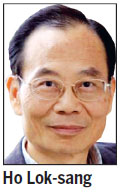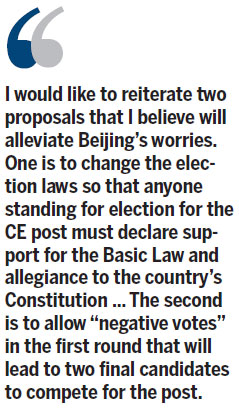Respecting the Basic Law offers hope for Hong Kong
Updated: 2014-03-25 06:57
By Ho Lok-Sang(HK Edition)
|
|||||||
About four weeks ago, I joined Backchat at RTHK along with Anson Chan and others in a discussion about political reform in Hong Kong. I was pleasantly impressed when Anson Chan said she takes the Basic Law as her Bible as she ponders universal suffrage for the 2017 CE election. I was pleasantly surprised when I found the proposal from her group, Hong Kong 2020, which was announced last week resembled very much the package that I proposed in this very column last year (Dec 24, 2013). Given Anson Chan's stature, there is a chance that her plan will draw support from the opposition camp. Given that indeed her proposal package is consistent with the Basic Law, there is also a chance that Beijing will take it seriously. For the first time, I see a ray of hope after months of gloom.
In essence, Anson Chan's key proposals are: First, direct elections of additional members on the Nominating Committee, to give it more credibility and to allow citizens' indirect participation in the nomination process; Second, a low threshold of 10 percent in nomination votes for candidates to be admitted as candidates for the Chief Executive (CE), to effectively allow people with different backgrounds to stand for election. These proposals are exactly the same as those in my Christmas Eve article last year. The proposals, instead of clamoring for civil nomination or political party nomination, give the Nominating Committee the full authority that the Basic Law intended and explicitly spelled out what it should have.
Chan expressed optimism that "Beijing does not believe Hong Kong people can't use their vote wisely to elect the CE," and said she believed the elected CE will not oppose the central government and Hongkongers are pragmatic when electing their leader.

From poll after poll, people are asked if they support the "Occupy Central" movement, but only a small minority does. It seems to me that the main objection against civil nomination is not that it is bad in principle but that it clearly deviates from the Basic Law. No matter how I look at it, I cannot see how Article 45 can be interpreted as permitting civil nomination or political party nomination. Arbitrarily "interpreting the law" as one likes is extremely dangerous. Similarly, the "Occupy Central" movement is billed as an act of "civil disobedience" and not just another legal demonstration. The refusal of those polled to support deviating from the law is a key reason why Hong Kong is ranked so high in the Rule of Law Index by the World Justice Project.
How, then, should we interpret the result of a majority of Hong Kong people supporting civil nomination? In a poll of 1,000 Hong Kong citizens, the Public Opinion Program recently got a return of 27 percent very much in support of civil nomination and 26 percent in support, for a total support of 53 percent. To me this is not surprising at all, because the poll question was asked in the historical and legal context in which Hong Kong now finds itself. Of course, giving every citizen equal political rights is in principle desirable. I would invite the pollsters to pose the question as: "Given the fact that the Basic Law explicitly requires nomination of CE candidates by a Nominating Committee, will you support deviating from the law and demanding civil nomination?" I bet that most Hong Kong people will say, "No".

Now that a respected leader in the opposition camp goes back to the Basic Law, the drawing board is open and we are back to working out a solution to the impasse. A key question now is: Given the central government's concerns for political stability, will Beijing take the risk of allowing someone that it may not trust stand for election. I have been arguing that these concerns cannot and should not be dismissed, and that if the opposition camp wants a liberal nomination procedure they should work hard to gain Beijing's trust. A first step to doing this is to show more trust in the central government. That is why it would be really silly for legislators to decline the invitation from Beijing to go to Shanghai to meet with central government officials.
In closing, I would like to reiterate two proposals that I believe will alleviate Beijing's worries. One is to change the election laws so that anyone standing for election for the CE post must declare support for the Basic Law and allegiance to the country's Constitution, and that a violation of this pledge can lead to disqualification in a court in Hong Kong. The second is to allow "negative votes" in the first round that will lead to two final candidates to compete for the post. Given that most Hong Kong people are pragmatic, candidates who cannot effectively communicate with Beijing and who are trouble-makers will have little chance of going into the final round. I am hopeful these two provisions will help win the confidence of Beijing that the next CE will work with the central government for the benefit of both Hong Kong and the mainland.
The author is a director of the Center for Public Policy Studies at Lingnan University.
(HK Edition 03/25/2014 page9)